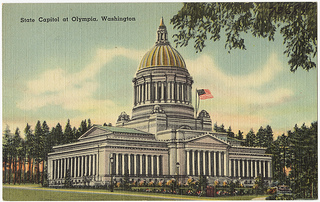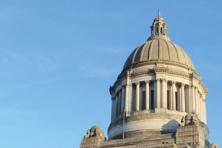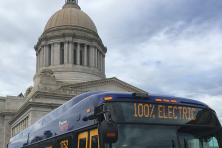Our Washington State Legislature didn’t get the job done on climate, again. It still seems that, no matter the urgency of the issue, or the intensity of the consensus on the need to act, and no matter who runs the place, Olympia just can’t get it together to challenge our fossil-fueled status quo.
Don’t get me wrong. There are a few areas in which progress was made in the fight to stop climate change. On balance, however, we made some field goals, but never reached the end zone.
CARBON TAX: Herculean efforts by Senators Reuven Carlyle and Guy Palumbo, with support from Governor Inslee, were not enough to convince the state Senate that SB6203 should become law. The proposal, an evolved version of Governor Inslee’s proposed tax on carbon pollution, was a measured and reasonable approach to putting a price on harmful fossil fuels and investing in ambitious energy transformation, all while protecting the most vulnerable people in our state. We appreciate the work Senators Carlyle and Palumbo did to thread a needle—cutting pollution while balancing the delicate politics of acting on climate.
At the end of the day those efforts didn’t succeed, but this carbon tax proposal was the first time any such policy had ever cleared a legislative committee anywhere in the 50 states. When, one day hopefully soon, our legislature does move a major climate policy, it will be in part because of the work of these legislators this year.
CLEAN FUELS STANDARD: Representative Joe Fitzgibbon proposed HB2338, a Low Carbon Fuel Standard (or Clean Fuels Program). British Columbia, Oregon and California each already have such a policy, making Washington the sole straggler along the West coast. Washington state produces significant quantities of biofuels, but most of the cleanest fuels we produce are sent to places that have a Clean Fuels Program. And while other states are creating a real carbon revenue stream for electrified cars, buses and trucks, Washington, a major EV market, isn’t capturing any of that value.
The program has never been introduced in the legislature before this year, and in this first outing it cleared two committees—despite opposition from Big Oil. Finally, however, it was not brought to the House floor for a vote.
100% FOSSIL FUEL PHASE OUT: I wrote about this at some length already, but this loss still smarts. We’re walking a fine and confusing line—if we succeed in transitioning to a low carbon economy, it’ll be in close partnership with electric utilities, and yet these same companies are among the greatest opponents of statewide climate action. Even as they take meaningful steps to electrify transportation in their service areas and promote energy efficiency, they remain dug in in opposition to policies that would end their addiction to burning coal and oil and natural gas.
The science is clear—we cannot get where we need to go unless we stop relying on fossil fuelsto generate electricity. While this bill survived numerous utility-led efforts to kill it—it cleared four different policy and fiscal committees, often with bipartisan support—HB2995 finally died on the last day of session. But this struggle is not over, and we’ll be back.
While lawmakers were not able to pass major climate and clean energy policies this year, they did take a number of meaningful smaller steps. The legislature passed a capital construction budget including nearly $100 million for clean energy, with significant investments in transportation electrification, efficiency, renewables, and grid modernization. The NW Energy Coalition successfully advocated to strengthen the State Building Code Council, critical for promoting energy efficient buildings, and secured increased revenue for this critical agency. The legislature also authorized the Department of Ecology to make use of the full $113 million allocated to Washington for mitigating Volkswagen’s emissions fraud, and included a provision to prioritize the funding for transportation electrification. Finally, the Department of Commerce proposed and passed a new incentive for renewable natural gas, a key part of a low carbon pathway.
These are important steps forward. But these small measures won’t be sufficient to bring us through the transition we need, unless we, as a state and as a country, take comprehensive action to fundamentally restructure our energy economy. If we remain unable to make that commitment, we will lose crucial opportunities to improve public health, and to promote a massive clean energy economy. We may even lose a livable planet.
Climate Solutions will keep working. We’ll work with activists and partners in many communities, not just the environmental community, to get our legislature to rise to the occasion. But we also cannot wait for legislators to realize the emergency before us. That’s why we’re not waiting until the next legislative session to work with local elected officials to commit to 100% clean and we’re going to strongly support initiative 1631 to do what the legislature could not—price the negative impacts of fossil fuels, and invest in the clean transition we need.




